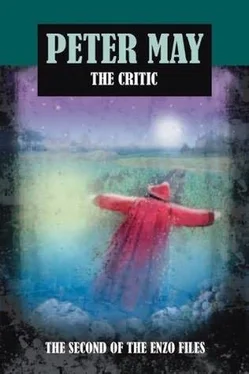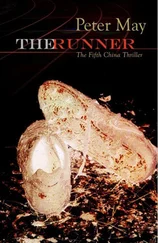Peter May - The Critic
Здесь есть возможность читать онлайн «Peter May - The Critic» весь текст электронной книги совершенно бесплатно (целиком полную версию без сокращений). В некоторых случаях можно слушать аудио, скачать через торрент в формате fb2 и присутствует краткое содержание. Жанр: Классический детектив, на английском языке. Описание произведения, (предисловие) а так же отзывы посетителей доступны на портале библиотеки ЛибКат.
- Название:The Critic
- Автор:
- Жанр:
- Год:неизвестен
- ISBN:нет данных
- Рейтинг книги:5 / 5. Голосов: 1
-
Избранное:Добавить в избранное
- Отзывы:
-
Ваша оценка:
- 100
- 1
- 2
- 3
- 4
- 5
The Critic: краткое содержание, описание и аннотация
Предлагаем к чтению аннотацию, описание, краткое содержание или предисловие (зависит от того, что написал сам автор книги «The Critic»). Если вы не нашли необходимую информацию о книге — напишите в комментариях, мы постараемся отыскать её.
The Critic — читать онлайн бесплатно полную книгу (весь текст) целиком
Ниже представлен текст книги, разбитый по страницам. Система сохранения места последней прочитанной страницы, позволяет с удобством читать онлайн бесплатно книгу «The Critic», без необходимости каждый раз заново искать на чём Вы остановились. Поставьте закладку, и сможете в любой момент перейти на страницу, на которой закончили чтение.
Интервал:
Закладка:
‘I could take you any day, old man.’
‘Maybe you could. But you’d suffer a lot of collateral damage in the process.’
The two men stood dripping in the rain, staring each other down, like animals in the wild. Each daring the other to make the first move. Each knowing that whatever the outcome, it would be bloody for them both. A few moments seemed to stretch into eternity. Then Fabien’s hand dropped to his side, and Enzo pushed past, their shoulders bumping, ungiving and hard, neither man wanting to lose face.
Fabien turned and watched, impassive, as Enzo got into his 2CV, backed it out around Fabien’s four-by-four, and headed back towards the road, down a track which had become a stream. Wipers smeared a fly-stained windscreen. Lightning flashed again across the valley, but the thunder had retreated beyond the hill. Like the threat of violence which had passed, its fury was spent and its roar muted.
III
Enzo pulled out eight inches of plastic from the roll in the machine and drew the cutter across it to make a plastic bag big enough to take a small trowelful of earth. Then, carefully, he placed the cut edge inside the machine and hit the start button. The plastic crinkled around the soil as the machine sucked out the air to create a vacuum before heat-sealing the bag.
He passed it to Sophie for labelling, cut another bag from the roll, and poured in the last of the eighteen samples they had collected.
There was a knock at the door. Michelle opened it, shaking her umbrella out on to the terrasse and propping it against the wall before stepping inside. ‘Hi.’ She tried to sound bright, but there was a tension behind her smile. ‘The rain’s really bad. Nobody’s picking grapes in this.’
Enzo had seen the harvesters out earlier, a frenzied attempt to strip as many of the vines as possible before the deluge. Now the vineyards were empty, harvesters abandoned, dripping in the rain.
Sophie cast Michelle a look, then turned back to her father who was concentrating on the final seal. ‘This is the one from Chateau Lacroux?’
‘Yes, the argile calcaire.’ It was a stony, chalky texture.
‘Hi,’ Bertrand said to Michelle. He was doing his best to ignore the atmosphere that Sophie was doing her best to create.
Michelle gave him a smile of appreciation and crossed the room to see what they were doing. She brought the smell of damp clothes with her and looked at all the bags laid out on the table. ‘Are those the soil samples?’
Enzo nodded as he hit the start button for the last time. ‘Yeah.’
‘I thought I was going to help with that.’
Without looking at her, Sophie said, ‘Some of us manage to get out of our beds earlier than others.’
Enzo glared at his daughter, remembering all the weekend mornings he’d had to tip her out of her bed in time for lunch. ‘We had to move fast before the rain started,’ he said.
The machine sucked the air out of the bag, then buzzed as it heat-sealed it shut.
‘Wow, where’d you get that?’ Michelle said.
Enzo straightened up and stretched his stiffening back. ‘At the hypermarket in town. It’s a food saver, for vacuum-sealing foodstuffs. Ideal for preventing contamination of the soil samples.’
‘How are you sending them to the States?’
‘I’m not. I’m taking them myself.’
Michelle pursed her lips. ‘Do you have official permission?’
‘Why would he need permission?’ Sophie glowered at her.
‘Because you can’t just go carrying soil samples with you on an airplane into the United States. Americans are paranoid about contaminants being brought in from other countries. Bugs and bacteria and viruses. They’re even scared you might carry something into the country in the treads of your shoes. That’s why you have to sign a form on the plane saying you haven’t been on a farm before travelling.’ She looked at Enzo. ‘You do have permission, don’t you?’
Sophie gazed up at her father with concern. ‘Do you?’
Enzo shrugged dismissively. ‘It could take weeks to get the paperwork sorted out for something like this. We don’t have the time.’
‘So how are you going to get them through customs?’ Bertrand said.
‘I’ll pack them into the lining of my suitcase. They’re not going to show up on the x-ray.’
But Michelle was shaking her head. ‘You know, these days the TSA are going through almost every bag. They find these things in your suitcase, not only will you lose them, you’ll be in deep shit.’
‘What’ll you do, Papa?’ For the moment, Sophie had forgotten her feud with Michelle.
‘I’ll think of something,’ Enzo said, as if thinking of something might be the easiest thing in the world. While, in truth, he hadn’t the least idea of what it was he would do. He turned instead towards his whiteboard and the coded review he had scrawled across it the day before. ‘Right now, we need to concentrate on breaking Gil Petty’s code.’
IV
The rain had not yet reached Lascombes, but as she drove up the winding track towards the farm, Nicole could see the clouds gathering on the distant horizon. The wind breathed through the hills in gasps and sighs, gathering in eddies where mountain streams cut through rock as old as time, shaking leaves from trees and lifting them up to carry them off on its wayward path.
Everything seemed so normal. The tractor stood in the yard, a chainsaw lying beside the wooden trestle where her father cut the logs. The dogs came running to greet her as they always did, oblivious to the death in their midst, recognising the pitch of the old Renault 4L that her father had bought for her at the car market. As she got out of it, the wind whipped about her face, and the dogs danced, barking, about her legs. She barely noticed them. She looked towards the stoop, where they had sat so often on warm summer evenings, her mother reading to her from the books she borrowed each week from the library van that came to the road’s end. And as the door of the house opened, she found it hard to believe that it would not be her mother who stepped out to greet her. Harder still to accept that it never would.
Her father stood in the doorway looking at her. Still with his old flat cap pushed back on his head, dungarees torn and stained from his labours on the farm, big boots caked with mud and shit. He looked miserable, desolate. Diminished somehow.
Tears sprang to her eyes again, and she ran across the yard and up the steps to throw herself into his arms. They stood for a long time holding each other, holding onto every memory they’d ever had of the woman they both loved, in case they might slip away just as she had. When, finally, she looked up into his face, she saw no tears in his eyes. Men like her father did not cry. They just bled inside and suffered in silence.
The sejour was dark, the remnants of oak logs smouldering in the cheminee, the smell of stale cooking hanging in still air. Her aunt took her in her arms and kissed her. She, too, was dry-eyed, but Nicole could see in them that there had been tears. There was a limit to how much crying you could do.
It was with an awful sense of dread that Nicole pushed open the door to her mother’s bedroom to see her laid out on the bed, candles burning on bedside tables at either side of her pillow. Their flames threw flickering shadows on the bloodless skin of her mother’s face, the only warmth in the blue-white chill of death. But the lines etched around her eyes and mouth by months of pain had gone. She looked at peace now, a strange serenity about her.
The air was filled with the scent of burning wax and something medicinal, like disinfectant in a hospital. Her mother’s hands were folded together in her lap. Nicole approached the bed to take one of them in hers. She was shocked by how cold it was. Shocked, too, by how little like her mother this dead person was: all animation and personality removed, life and laughter long departed. Leaving only the vessel that had borne them. Not really her mother at all.
Читать дальшеИнтервал:
Закладка:
Похожие книги на «The Critic»
Представляем Вашему вниманию похожие книги на «The Critic» списком для выбора. Мы отобрали схожую по названию и смыслу литературу в надежде предоставить читателям больше вариантов отыскать новые, интересные, ещё непрочитанные произведения.
Обсуждение, отзывы о книге «The Critic» и просто собственные мнения читателей. Оставьте ваши комментарии, напишите, что Вы думаете о произведении, его смысле или главных героях. Укажите что конкретно понравилось, а что нет, и почему Вы так считаете.












